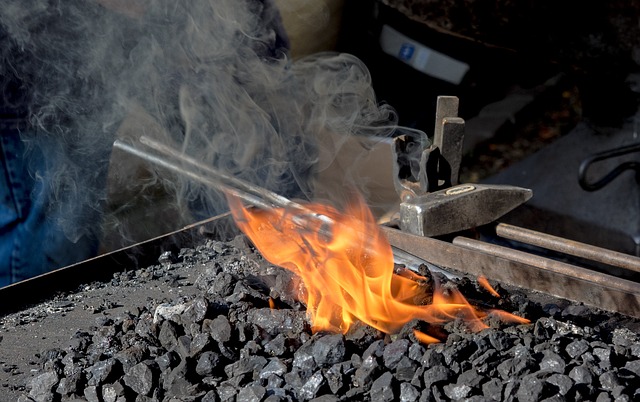In Parashat Naso we learn about the Mitzvah of Nazir, the Byblical Jewish hermit. That’s a person who has been exposed to some unlawful conduct, as witness or participant, and wishes to cleanse his soul.
הרואה סוטה בקלקולה יזיר עצמו מן היין
He who has witnessed a Sotah (a divergent woman) in her downfall should vow to abstain himself from wine becoming a Nazir
The idea is simple. In order to reinstate balance which was lost, one should usually go to the other extreme. Hope is that when efforts cease, equilibrium will reign again. Just like an iron bar which is bent the wrong way, no efforts to straighten it will succeed until one bends it completely the other way. Then, it will find its middle and stand straight. So in מידות, correcting the traits of the soul, in order to arrive at the Middle Way, which is the only right way according to Judaism (as the Rambam writes in several places), one must occasionally, and for a limited time only, go to the extreme.
The Torah enforces this attitude in an interesting way:
When the Nazir ends his period of hermitage, he has to bring sacrifice to the Temple. That sacrifice is referred to in the Torah as an “atonement for the spirit”, מאשר חטא על הנפש, and it is asked – what sin has that soul committed? Our Sages answer that, indeed, hermitage, abstaining from any of the goods this world has to give us, is a sin. The Nazir has to atone for his avoiding wine.
A wonderful Hassidic tale from the early period of Hassidut (a bit after the Baal Shem-Tov) tells about R’ Elimelech from Lijensk who goes to visit his great Rabbi Reb Schmelkeh from Nikelshburg. On the way there, R’ Reb Elimelech hears from one house a young man learning the Gemara fervently, singing, all exhilarated with devotion. He has to see this from up close, and he approaches and stands there looking and listening intently. The young Bucher doesn’t even notice him, for a long while. When he finishes his Limud, R’ Elimelech goes to him and says:
Repent! Repent, oh brother! Find your way back to Hashem!
He then leaves.
The young man, who would grow up to be the great R’ Mordechai Bennet, is dumbfounded. He had recognized the great Lijensk Rebbe, and knows this is not anything but meaningful. And he doesn’t know what to do. Finally, he decides to go himself, to the great Rabbi of his town too, to Reb Schmelkeh.
The Rabbi doesn’t have to think much, and upon hearing the story he immediately explains:
“Rabbi Reb Elimelech perceived in you that you had fasted for the purification of your soul, but being feeble because of the fast made you study slightly less, and slightly less good, a Bitoul Torah. For that he had scolded you… ”
This tale seems to demonstrate how the way of the Torah does not like us to torture ourselves even if it’s in order to become holier, and Rabbi Bennet was scolded for fasting.
But two things seem strange in this story.
One is that the young genius was rebuked for some fault in his Torah studies, after R’ Elimelech seemed all but enchanted by the sound of his Limud (Gemara learning).
The second and most peculiar thing, which makes it quite the opposite of what the Torah seems to be saying, is that whereas in the Torah being Nazir may not be “Middle Way”, it’s still a Mitzvah, and the thing to do, in order to cleanse and protect the spirit, here, fasting seems just a vice, a bad thing to do!
And from this, another question – what about the crooked “iron bar”?! What other way is there to “straighten it” , if fasting and such other penitential methods are not to be used?! Isn’t what R’ Elimelech preaches like trying to straighten a bar by merely pushing it to the middle?
Here we need a bit of historical background.
The Rabbis we’re talking about are from early Hassidut, just after the time of the founder of that movement – the Baal Shem-Tov. It was a time when it was common practice for the Righteous to torture themselves, fasting, rolling naked in the snow and other measures in order to purify their souls and atone for the People of Israel. But the Baal Shem-Tov in the way of Hassidut he had founded, opened a new way: it is through warmth of the heart, gaiety and mirth in devotion and worship og G-d, שמחה, that all spiritual achievements are to be attained.
But what about that iron bar?
Well, through heat and warmth you can indeed straighten an iron bar, without bending it the other way, and so it is with the spirit.
It is exactly because of the fervor of Rabbi Bennet’s study of the Gemara, that the Rabbi from Lijensk understood that for him, fasting is wrong.
And that’s the way of Hassidut!


Our lifestyle of love makes up for a fair amount of personal shortcomings. God’s love is the hottest flame there is; He cherishes our love, so much so, that He is willing to work with our flawed attempts to live a godly life by straightening out our crookedness (those crooked iron bars).
As iron sharpens iron, so your blogs have become an inspiration to me and my husband (I shared your article about the Tree of Knowledge with him). We appreciate your writings. It opens up a whole new world. Blessings to you and your family!
LikeLiked by 1 person
I appreciate the warmth radiated… It helps me go on! All the best to you too, Evelyn, Bill!
LikeLiked by 1 person
Is not the heat applied to the iron bar a form of opposite force?
To step outside of the constraints of the iron bar is the only way to avoid it’s bend.
LikeLike
Jo, iron bar, heat, bending, are all metaphors, of course. The whole point of the story is that there are other ways to self purify, than self torture and penitence. “Heat” here means gaiety, enthusiasm, devotion, in study and worship, as Hassidut teaches. You may say that that’s really “stepping outside the constraints”, as it is not with force that we fix what’s crooked.
LikeLike